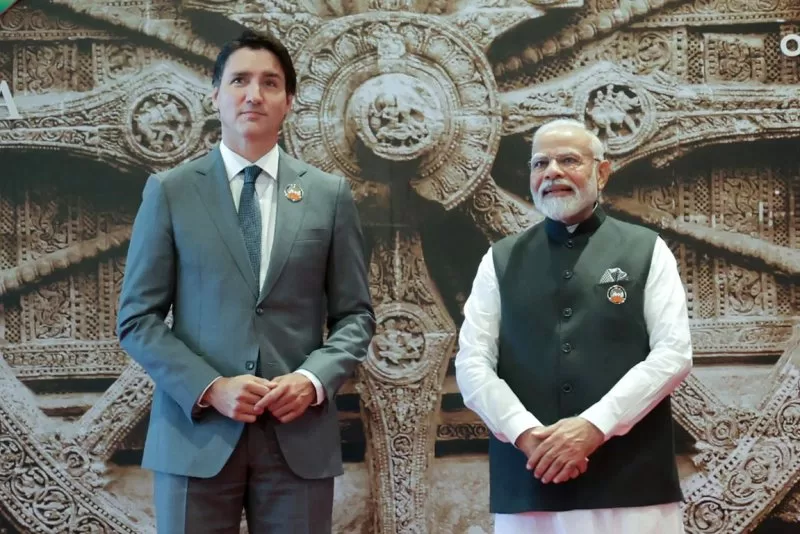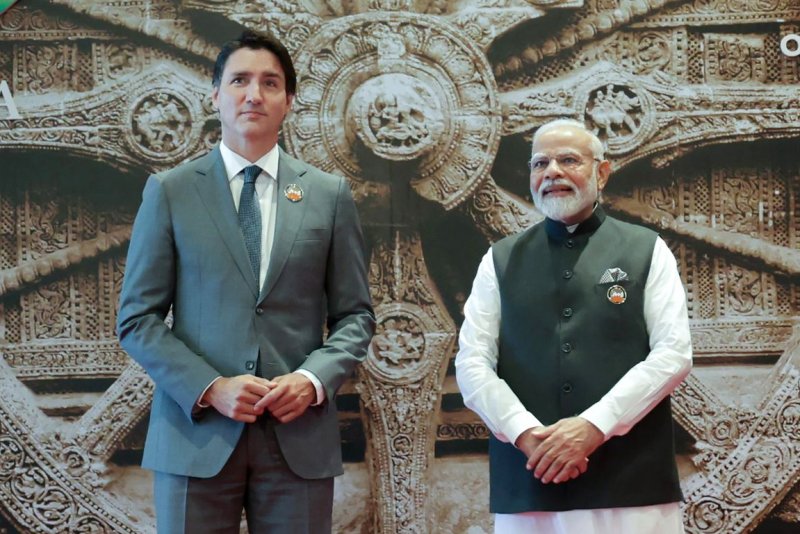Prime Minister Narendra Modi and Prime Minister of Canada Justin Trudeau separately condemned violence that erupted at a Hindu temple in Canada over the weekend. File Photo by Press Information Bureau/UPI |
License PhotoNov. 5 (UPI) — Prime Minister Justin Trudeau of Canada and Prime Minister Narendra Modi of India condemned violent protests that erupted in a Canadian city over the weekend as the conflict between their two countries appears to be spilling over into the streets of the Great White North.
Canada has accused India of posing a threat to the lives of those who support the separatist Khalistan movement, which seeks to create a separate homeland for Sikhs in India’s Punjab region.
Ottawa has alleged that India was involved in the assassination of at least one Khalistan leader on Canadian soil — Hardeep Singh Nijjar in September 2023 — but federal law enforcement has said it has document more than a dozen credible and imminent threat to the lives of members of this community.
Late Monday, police in the southern Ontario city of Brampton — where nearly 160,000 India-born immigrants call home — dispersed an apparent pro-India protest outside the Hindu Sabha Mandir after weapons were seen within the demonstration.
Peel Regional Police declared the demonstration “an unlawful assembly” and ordered everyone to “leave the area now or face arrest.”
The Coalition of Hindus of Canada, a far-right Hindu nationalist organization, said the protest was against “the increasingly brazen attacks on Hindu temples.”
The demonstration was held after Peel Regional Police announced the arrest of three people in Brampton and Mississauga for charges related to violent protests on Sunday in those two cities.
In Brampton, authorities said that on Sunday, violence broke out between Hindu worships and demonstrators at the same Hindu temple.
Vasudev Joshi, a pandit at the Hindu Sabha Mandir, told The Toronto Star that the protest was held against Indian consular officials, who were invited to the temple that day to help senior members apply for pensions.
“At the same time, a small group of Khalistani [supporters] came outside and raised their flags and slogans,” Joshi said. “After that, it got violent. Some people were trying to get in and they started beating and fighting.
Videos of the incident circulated online, which UPI could not independently verify, show demonstrators waving pro-Khalistan flags as the two groups clashed. Flags were then used to beat one another.
Pro-Khalistan group Sikhs for Justice claimed that the Khalistan protesters were attacked while “demonstrating against the presence of indian Consulate Officials who were hiring proxies to spy on Canadian Sikhs on Canadian soil.”
Both Trudeau and Modi were quick to condemn the violence.
The Canadian leader called the acts of violence were “unacceptable,” declaring, “Every Canadian has the right to practice their faith freely and safely.”
Modi, whose government has denied allegations in targeting Canadian citizens on Canadian soil, framed the protest as a “deliberate attack on a Hindu temple” and “cowardly attempts to intimidate our diplomats.”
“Such acts of violence will never weaken India’s resolve,” he said on X. “We expect the Canadian government to ensure justice and uphold the rule of law.”
Trudeau first accused India of being involved in Nijjar’s assassination in June, and last week, his deputy foreign affairs minister publicly accused Indian Home Minister Amit Shah of being involved in plots targeting the Sikh separatists in Canada.
Canada has said it has repeatedly approached India about the issue and has presented it with evidence.
During a parliamentary national security committee hearing last week, federal officials said that India collects information on Canada-based individuals, which is then shared with senior government officials who direct a criminal organization to conduct the assassinations and other violent crimes.
India has denied all allegations and has rebutted that Ottawa has failed to produce any evidence.

